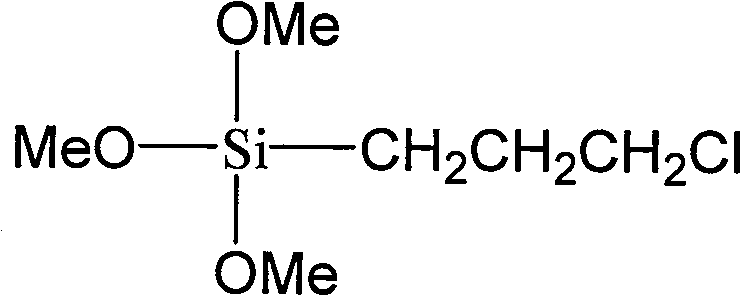Sulfuric silane coupling agent and its synthesis process
A technology of sulfur-silane coupling agent and silane coupling agent, which is applied in the field of sulfur-containing silane coupling agent and its synthesis, can solve the problems of high mixing temperature, high porosity of rubber material, and scorch of rubber material, and achieve good Reinforcing performance, promoting dispersion, and not easy to burn the rubber
- Summary
- Abstract
- Description
- Claims
- Application Information
AI Technical Summary
Problems solved by technology
Method used
Image
Examples
Embodiment 1
[0020] In a 100mL three-neck round bottom flask, under the protection of high-purity nitrogen, put 4.51g of potassium ethyl xanthate into it, and add 20mL of methanol to dissolve it. 4.65 g of trimethoxychlorosilane was dissolved in 20 mL of methanol, and the solution was added dropwise to the flask through a constant pressure funnel within 15 minutes. Raise the temperature to 65°C, reflux in methanol for 4 hours, cool to room temperature and stir for 12 hours, filter off the precipitated potassium chloride at the bottom of the bottle, distill off the solvent and unreacted raw materials, and then distill under reduced pressure to obtain 3.59 g of yellow liquid, which is The product has a molecular weight of 284 as detected by mass spectrometry.
Embodiment 2
[0022] In a 100mL three-neck round bottom flask, under the protection of high-purity nitrogen, put 3.76g of potassium ethyl xanthate into it, and add 15mL of methanol to dissolve it. 4.59 g of trimethoxychlorosilane was dissolved in 20 mL of methanol, and the solution was added dropwise to the flask through a constant pressure funnel within 15 minutes. Raise the temperature to 55°C, reflux in methanol for 8 hours, cool to room temperature and stir for 4 hours. After separation, 2.56 g of a yellow liquid is obtained, which is the product. The molecular weight is 284 as detected by mass spectrometry.
Embodiment 3
[0024] In a 100mL three-neck round bottom flask, under the protection of high-purity nitrogen, put 6.77g of potassium ethyl xanthate into it, and add 30mL of methanol to dissolve it. 4.71 g of trimethoxychlorosilane was dissolved in 20 mL of methanol, and the solution was added dropwise to the flask through a constant pressure funnel within 30 minutes. Heat up to 45°C, reflux in methanol for 12 hours, cool to room temperature and stir for 12 hours, filter off the precipitated potassium chloride at the bottom of the bottle, distill off the solvent and unreacted raw materials, and then distill under reduced pressure to obtain 3.96 g of yellow liquid, namely It is the product, and its molecular weight is 284 as detected by mass spectrometry.
PUM
 Login to View More
Login to View More Abstract
Description
Claims
Application Information
 Login to View More
Login to View More - R&D
- Intellectual Property
- Life Sciences
- Materials
- Tech Scout
- Unparalleled Data Quality
- Higher Quality Content
- 60% Fewer Hallucinations
Browse by: Latest US Patents, China's latest patents, Technical Efficacy Thesaurus, Application Domain, Technology Topic, Popular Technical Reports.
© 2025 PatSnap. All rights reserved.Legal|Privacy policy|Modern Slavery Act Transparency Statement|Sitemap|About US| Contact US: help@patsnap.com



